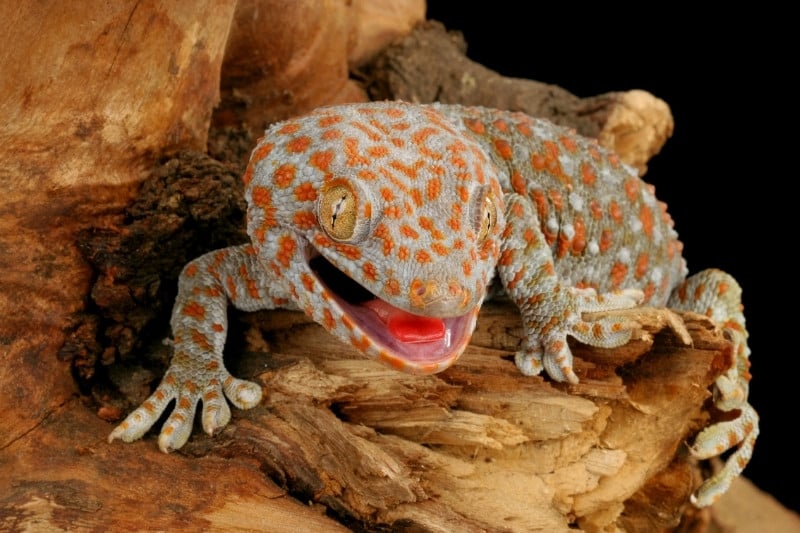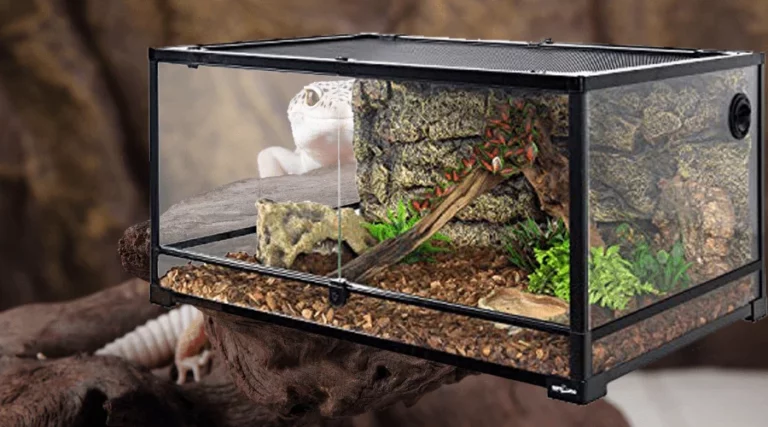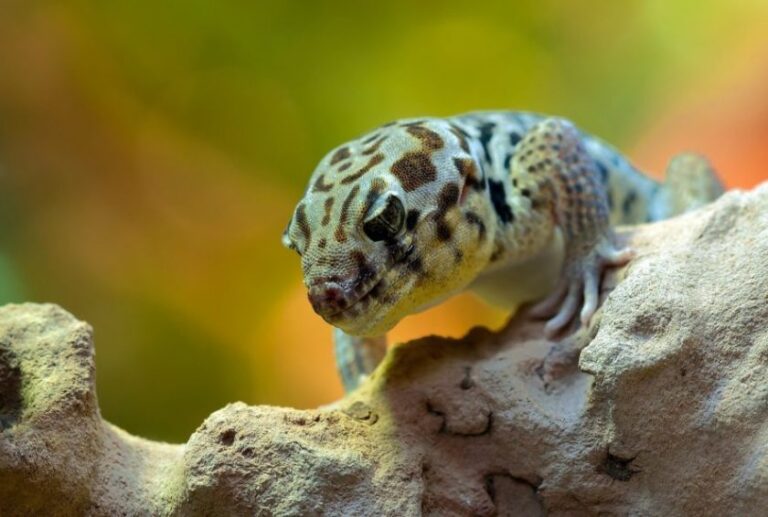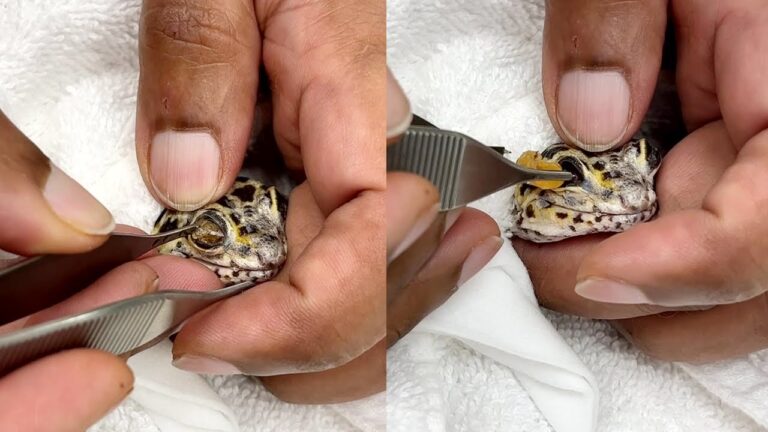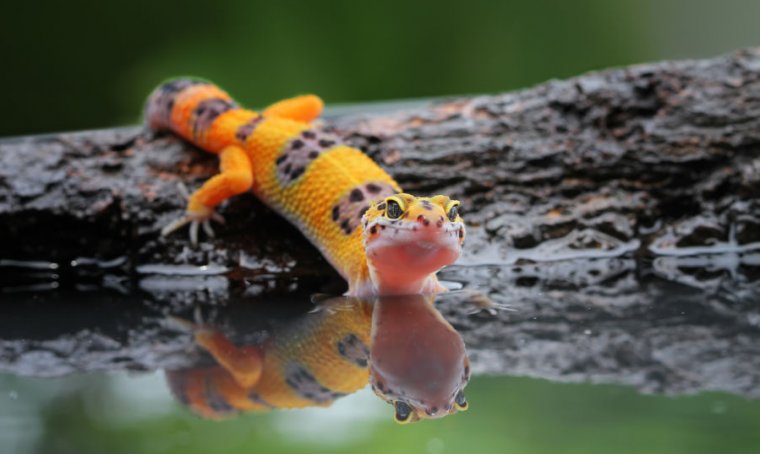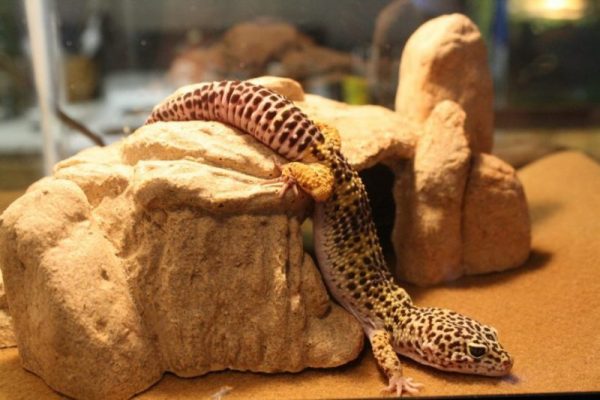What Do Tokay Geckos Eat? The Culinary Adventures
As I embarked on my journey to unravel the secrets of the enigmatic Tokay gecko, I found myself drawn into a world of intrigue and wonder. The quest to discover “What do Tokay geckos eat?” led me to a captivating exploration of their dietary preferences, offering insights into the lives of these mesmerizing creatures.
So, I found that
Tokay geckos have a taste for invertebrates, such as moths, locusts, grasshoppers, beetles, cockroaches, termites, crickets, mosquitoes, and spiders. Occasionally, they might even munch on small rats, mice, or snakes.
So, let’s embark on this journey together and quench our curiosity about what truly satisfies the appetites of these captivating reptiles.
Diet for Tokay Geckos
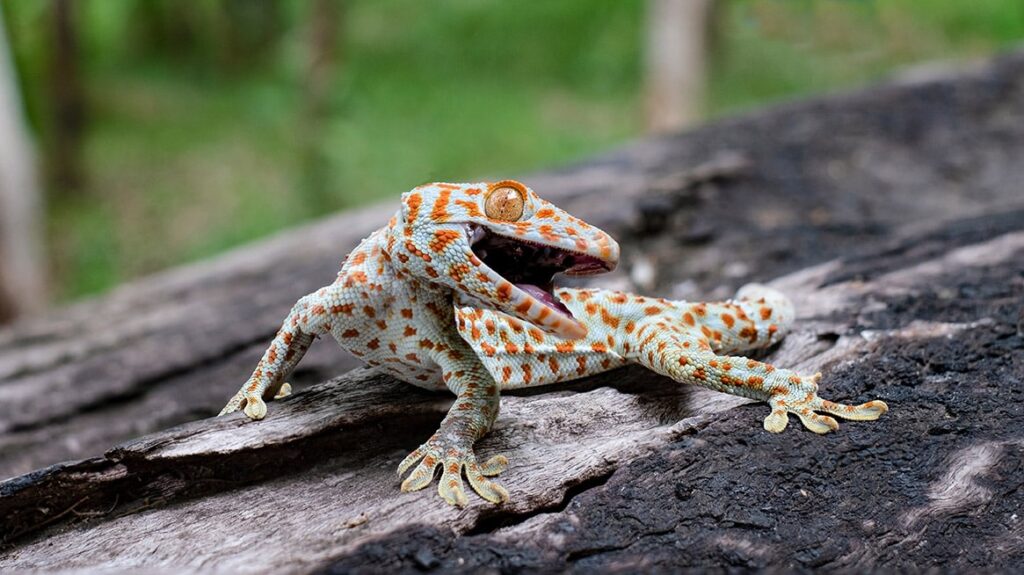
Daily Staples (Feeding every 2-3 days for adults):
Dubia Roaches: Inexpensive, easy to keep alive, and nutritious.
Hornworms: Soft-bodied, easy to digest, high in nutrients.
Black Soldier Fly Larvae (Nutrigrubs): High in calcium, suitable for regular feeding.
Superworms: Well-rounded in nutrients, easy to gut-load, and feed.
Crickets: Nutrient-rich but can be challenging to keep due to their tendency to escape.
Silkworms: High in nutrients, containing serrapeptase, which can be beneficial for sick reptiles.
Treat Bugs (2-3 times per week):
Waxworms: Soft-bodied and suitable for larger geckos, but high in fat.
Butterworms: Similar to waxworms in nutrition, also high in fat.
Mealworms: Can be used as a treat but not the primary staple due to chitin content.
Supplement Schedule for Tokay Geckos
| Supplement Schedule | Babies (0-6 months) | Juveniles (6-12 months) | Adults (12+ months) |
| Calcium (no D3) | 3 times per week | 2 times per week | 1 time per week |
| Calcium plus D3 | 2 times per week | 2 times per week | 1 time per week |
| Multivitamin | 1 time per week | 1 time per week | 1 time per week |
Insects to Avoid Feeding to Tokay Geckos
Fireflies: Fireflies contain a chemical called lucibufagins, which is toxic to it if ingested. It’s best to steer clear of these insects entirely to protect your gecko’s health.
Ladybugs: Despite their visually appealing appearance, ladybugs secrete a toxin known as hemolymph, which can harm it. Avoid offering as a food source.
Monarch Butterflies: Monarch butterflies are known to be toxic to various animals, including your pet. Do not feed them or any insects that resemble them.
Spiders: It’s not recommended to feed spiders to captive Tokay Geckos. They can carry parasites, toxins, and sharp fangs that can harm geckos during consumption.
Ants: While they may consume ants in the wild, it’s generally best to avoid feeding them ants in captivity. Also, contain toxic elements harmful to your pet, and they are also known to bite.
High-Quality Reptile Supplements for Optimal Health
1. Zoo Med Calcium No D3:
Pros:
- Provides essential calcium for reptile health.
- Ideal for reptiles that receive adequate UVB lighting.
- Fine particle size for effective dusting of prey items.
- Suitable for various reptile species.
Cons:
- Lacks vitamin D3, which is necessary for calcium absorption in reptiles.
2. Repti-Calcium without Vitamin D3:
Pros:
- High-quality calcium source for reptiles.
- Fine texture ensures thorough coating of feeder insects.
- Ideal for species with D3 tolerance.
- Suitable for diverse reptile diets.
Cons:
- Does not contain vitamin D3, which may require additional supplementation.
3. Exo-Terra Calcium Powder without D3:
Pros:
- Provides calcium along with essential vitamin D3.
- Promotes calcium absorption, benefiting reptiles with high D3 requirements.
- Fine powder consistency for easy dusting.
Cons:
- Vitamin D3 is not included, necessitating separate supplementation.
4. Exo-Terra Calcium Powder Plus D3:
Pros:
- Provides calcium and essential vitamin D3 for reptile health.
- Convenient for reptiles with limited UVB exposure.
Cons:
- May not be suitable for species already receiving adequate UVB lighting.
5. Zoo Med Calcium Powder Plus D3:
Pros:
- Offers calcium and vitamin D3 for a balanced supplement.
- Supports calcium absorption and overall reptile health.
- Easy-to-use powder form for dusting insects.
Cons:
- Not recommended for species with ample UVB exposure.
6. Exo-Terra Multivitamin Powder:
Pros:
- Provides a broad spectrum of vitamins for reptile vitality.
- Helps prevent nutritional deficiencies in captive reptiles.
- Powder form for convenient supplementation.
Cons:
- May not be necessary if the reptile already receives a well-balanced diet.
7. Rep-Cal Herptivite Multivitamin Powder:
Pros:
- Comprehensive multivitamin supplement for reptiles.
- Supports overall health, growth, and vitality.
- Fine powder consistency for easy application.
Cons:
- Additional supplementation may be redundant if the reptile’s diet is already balanced.
Elevate Reptile Nutrition with Expert Gut-Loading
Gut-loading your feeder insects is an indispensable practice when it comes to providing optimal nutrition for your insectivorous reptiles. This vital process ensures that your beloved reptilian companions receive essential vitamins and minerals through their prey.
To embark on this nutritional journey, you have two main paths to choose from.
First, you can meticulously curate a nutrient-rich salad for your feeder insects. Over a few days, these will consume this specially prepared feast, becoming nutrient powerhouses themselves. However, this approach can be expensive, labor-intensive, and potentially attract unwanted insects.
Enter the second option, a hassle-free and efficient choice:
commercial gut-loading products. These specialized formulations are tailor-made to provide a comprehensive spectrum of nutrients, sparing you the effort of creating insect salads. Not only do they simplify the process, but they also eliminate the mess and potential pest problems associated with fresh fruits and vegetables.
Consider these exceptional products for your gut-loading needs:
Bites for Roaches: A reliable choice for enhancing the nutritional value of your roach feeders, ensuring your reptiles get the best.
Nature Bites: Nature’s way of boosting your feeder insects’ nutritional content, promoting healthier reptile diets.
Hornworm Food: Specifically designed to fortify hornworms with essential nutrients, giving your reptiles a nutritional feast.
Total Bites With Spirulina: Elevate your insectivorous reptiles’ diet with the power of Spirulina, a nutrient-rich superfood, and ensure they receive a well-rounded nutritional boost.
Enhance Your Gecko’s Diet with Premium Commercial Gecko Food
When it comes to providing a well-rounded and nutritionally balanced diet for your beloved gecko, pre-packaged gecko diet food products are a game-changer. These meticulously crafted formulations, designed by experts in reptile nutrition, offer a diverse range of essential nutrients. Not only do they introduce variety to your gecko’s menu, but they also serve as a healthy supplement, addressing any potential vitamin deficiencies.
Opting for a high-quality gecko diet product allows you to incorporate these dietary gems into your gecko’s regular feeding routine, typically a couple of times per week. Here are some standout recommendations:
Pangea Fruit Mix & Insects: A delightful blend of fruits and insects that’s not only delicious but also packed with the nutrients your pet craves.
Pangea Apricot Fruit Mix: Treat your gecko to the sweet goodness of apricots while ensuring they receive vital nutrients.
Pangea Fruit Mix Watermelon Mango: A tropical delight that adds a burst of flavor and nutrition to your gecko’s diet.
Pangea Fruit Mix Banana Papaya: Rich in fruity goodness, this mix is a tasty way to boost overall health.
Pangea Fruit Mix Gecko Treat: A special treat, providing both a flavorful experience and essential nutrients.
Pangea Gecko Diet Fig & Insects: The perfect fusion of figs and insects, offering a unique and nutritious dining experience for your gecko.
Ensuring Proper Hydration for Tokay Geckos
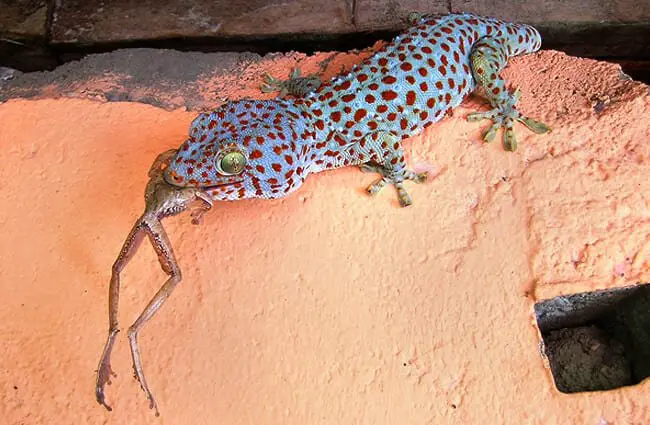
Sustaining optimal hydration for Tokay geckos is paramount to their well-being. There are several effective methods to accomplish this essential task:
Water Dish: Providing a generously sized water dish within the enclosure is a fundamental approach. However, diligence is key – it must be kept meticulously clean and refreshed daily to ensure a safe and reliable water source.
Misting & Licking: Tokay geckos possess the ability to hydrate by licking water droplets from various surfaces within their enclosure. To facilitate this natural behavior, it’s imperative to maintain a clean and hygienic tank environment.
Also, regular misting of the enclosure a few times each day creates these crucial droplets. While many of them eventually learn to drink from a dish, younger ones might benefit from having multiple hydration options until they recognize the still-standing water source.
Water Dripper: For a more sophisticated approach, you can use commercial products like the Big Dripper. These systems allow water to gently drip into the tank, creating accessible droplets for your gecko to drink from. It’s a convenient and effective method to ensure a consistent water source.
How Often Should I Feed My Tokay Gecko?
| Life Stage | Age | Feeding Frequency | Recommended Diet |
| Hatchling to Baby | 0 – 6 months | 2-3 times daily | – Extra small to small feeder insects – Small amount of commercial diet food (if desired) |
| Juvenile | 6 – 12 months | Once per day | – Small to medium-sized live feeder insects – More commercial diet food than hatchlings |
| Adult | 12+ months | Every 2-3 days | – Large feeder insects – Small prey items (e.g., pinkie mice) – Larger amount of commercial diet food |
FAQs
Can Tokay Geckos Eat Pinkie Mice?
Yes, Tokay geckos can occasionally eat pinkie mice as part of their diet. However, it should be offered sparingly and not as a primary food source.
Can My Tokay Gecko Eat Eggs?
Yes, Tokay geckos can consume eggs, particularly hard-boiled eggs, as an occasional treat. Eggs should be provided in moderation as part of their varied diet.
Are There Other Small Animals I Can Feed My Tokay Gecko?
Yes, While primarily insectivorous, Tokay geckos can occasionally be offered other small animals like crickets, mealworms, and small roaches. However, it’s essential to diversify their diet and offer these items in moderation.
Final Words
In conclusion, my journey to uncover the culinary preferences of Tokay geckos has been a captivating adventure. From the vibrant jungles of Southeast Asia to the enigmatic world of these reptiles, I’ve learned that these geckos have a diverse palate, primarily relishing invertebrates like moths, locusts, grasshoppers, beetles, cockroaches, termites, crickets, mosquitoes, and spiders. Surprisingly, they occasionally indulge in small rats, mice, or even tiny snakes.
Further, this insight into their diet not only deepens our understanding of these remarkable creatures but also highlights the fascinating diversity of life in our natural world. As I reflect on this journey, I’m reminded of the importance of respecting and preserving the delicate ecosystems that support these unique and beautiful creatures, ensuring their continued existence in our ever-changing world.

